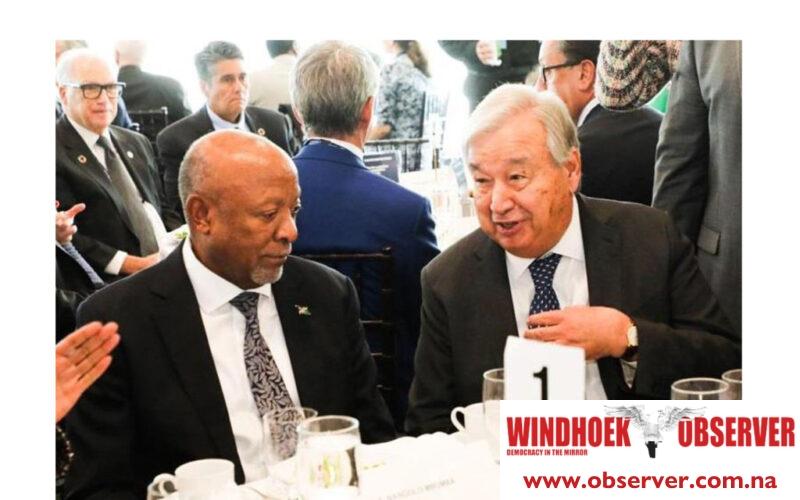Niël Terblanché
President Nangolo Mbumba addressed the Private Sector Forum, at the Summit of the Future, and said that bold leadership will play a critical role in international cooperation and in addressing global challenges.
He said the adoption of the Pact for the Future is an ambitious document that calls for world leaders’ commitment to building a stronger, more inclusive multilateral system.
“The Pact addresses key issues such as international peace and security, digital technology, sustainable development, and financing for development, all of which are central to responding to the complex challenges of the 21st century,” he said.
Mbumba added that the Pact of the Future offers global leaders an opportunity to showcase political will and commitment.
“We cannot confront these challenges if we don’t restore trust,” he said.
He also stressed the need for unity and collective action to create a more inclusive, sustainable, and prosperous world.
According to Mbumba, the summit presents a platform for reflecting on how international cooperation can effectively address current and emerging global challenges.
“The “Pact for the Future” is positioned as a beacon of hope for present and future generations, with the potential to advance the 2030 Agenda and fast-track the implementation of the Sustainable Development Goals (SDGs),” he said.
Mbumba added that while adopting the pact sets the political tone, its success depends not only on the actions of governments but also on strong partnerships with the private sector.
“The private sector plays a vital role in employment creation, technological advancement, infrastructure provision, and innovation, all of which are critical enablers of sustainable development,” he said.
He stressed that governments must create conducive policy and regulatory environments to attract private investment in projects aligned with national development priorities, thereby allowing for economic growth and inclusive sustainable development.
Mbumba reiterated the call for bold leadership and inclusive governance from both public and private sectors, urging the business community to accelerate action on the SDGs.
“We need partnerships with the private sector to help finance key transitions and bring innovation in international cooperation,” he said.
Before addressing the Private Sector Forum, President Mbumba welcomed delegates at the reception event for the Summit, acknowledging the magnitude of challenges such as climate change, inequality, and poverty.
In his address he stated that these issues are far too complex for any one nation to tackle alone, calling for unity, solidarity, and purposeful collective action.
“The Pact for the Future stands as a testament to the spirit of fraternity and mutual responsibility in tackling shared challenges,” he added.
Reflecting on Namibia’s involvement in the drafting of the pact, Mbumba expressed appreciation for the efforts of Namibia’s Permanent Representative to the United Nations, Ambassador Neville Gertze, and his German counterpart, Ambassador Antje Leendertse, for their leadership in navigating the complexities of the negotiations.
He also acknowledged the United Nations Secretary-General and the General Assembly Presidents for their trust and confidence in Namibia and Germany to lead the process.
Mbumba reiterated Namibia’s commitment to playing its part in the implementation of the pact, calling on member states to seize the moment and ensure that “no man, no woman, and no child is left behind.”
He pointed to the enduring and positive relationship between Namibia and Germany and said that while the shared history of the two countries may be complex, their collaboration moving forward is rooted in mutual trust and cooperation.
Mbumba stressed that the success of the Pact for the Future lies not just in its adoption but in its implementation by member states.




